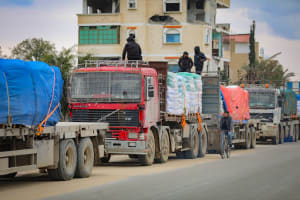As long as her friends remain in Hamas captivity, 'I will not be able to recover,' says released Israeli hostage

Adina Moshe was one of 240 Israelis kidnapped by Hamas terrorists in her home on Kibbutz Nir Oz on Oct. 7, when the terror group and its accomplices invaded Israel's southern border communities in an unprecedented brutal attack.
In late November, Moshe was released together with mostly elderly women, mothers and children in a hostage deal between the Jewish state and the terror group Hamas.
The 72-year-old former Israeli hostage told reporters that she would not be able to recover from the trauma of her experience in Gaza as long as her “good friends” remain in Hamas captivity.
Moshe urged Israeli and international authorities to do everything in their power to bring the remaining 138 hostages home.
“I am begging and asking with all my heart, please do everything it takes to release them so that I can recover as well. Because until they are back, my heart is there and I will not be able to recover,” she said.
Moshe emphasized that some of the remaining hostages in Gaza are old, frail and lack access to necessary medicines.
"They are all very old, with serious background diseases and without proper medication," Moshe said.
She is far from the only one who remains traumatized from her experience as a hostage in the hands of Hamas and its accomplices.
Margalit Mozes, a 77-year-old woman, also a resident of Kibbutz Nir Oz, was released on Nov. 24, the same night as Adina Moshe.
Due to a medical condition, Mozes needs an oxygen tank to facilitate her breathing while sleeping during the night. However, she revealed that a Hamas terrorist “who was angry with me” and took her oxygen tank from her.
“I told him it was my oxygen, and I spoke to him in Arabic, and he understood exactly. But he didn’t care. He took it and went back,” she said.
"I could just breathe like that, but could not fall asleep like that. I did not sleep for 49 days," Mozes added.
She also revealed further details about the mental and physical difficulties of being held in captivity in subterranean tunnels.
"Mental difficulties, physical difficulties. And with every day that passes it becomes more and more difficult. The state of being a hostage in the tunnels, or wherever you are, is an unbearable, very difficult situation, and in unbearable conditions," she shared.
Other released hostages have spoken about conditions of starvation and extreme abuse at the hands of Hamas in Gaza.
“We are starting to hear details from the hostages, and they describe what amounts to torture. I am not going to detail everything we hear, just what was published by the families themselves,” said Nadav Eyal, a columnist from Israel's Yedioth Ahronoth news outlet.
Eyal appeared to be particularly shocked by the story of Eitan Yahalomi, a 12-year-old Israeli boy who was abused by Gazans and then forced by Hamas terrorists to watch extreme footage of the terror organization’s massacres in his home community.
“A 12-year-old, kidnapped alone after his father was shot, was beaten by Gaza residents and forced at gunpoint by Hamas to watch videos of their murder spree and massacres,” Eyal wrote.

The All Israel News Staff is a team of journalists in Israel.














